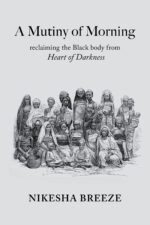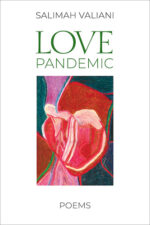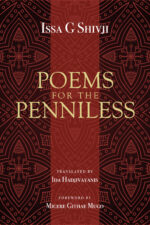-
A Mutiny of Morning: Reclaiming the Black Body from Heart of Darkness
USD $ 5.00 USD $ 15.00Price range: USD $ 5.00 through USD $ 15.00Select options This product has multiple variants. The options may be chosen on the product pageA Mutiny of Morning: Reclaiming the Black Body from Heart of Darkness
USD $ 5.00 USD $ 15.00Price range: USD $ 5.00 through USD $ 15.00Nikesha Breeze has taken pages from Joseph Conrad’s Heart of Darkness, taken his words, and forced them to leave his colonized mind. She has made the words her own in poetic form. She illuminates the invisible Black voices inside, a radical, surgical, and unapologetic Black appropriation, at the same time as a careful birthing and spiritual road map. The resulting poems are sizzling purifications, violent restorations of integrity, pain, wound, bewilderment, rage, and, sometimes, luminous generosity. This is a work of Reclamation. The author, Nikesha Breeze, has slowly, page by page, reclaimed the text of the book Heart of Darkness by Joseph Conrad. This racist turn-of-the-19th-century book was pivotal in the continued dehumanization of Black people and in particular of African people, as it painted an image of bestiality on the Congo people and the continent. It is laced with racist imagery and language. The author has reappropriated the book, page by page, making “BlackOut” poetry for each page, isolating methodically the words to create new poems of power and black voice within the text —stealing the language and reappropriating the power.
Select options This product has multiple variants. The options may be chosen on the product page -
Love Pandemic: Poems
USD $ 5.99 USD $ 10.00Price range: USD $ 5.99 through USD $ 10.00Select options This product has multiple variants. The options may be chosen on the product pageLove Pandemic: Poems
USD $ 5.99 USD $ 10.00Price range: USD $ 5.99 through USD $ 10.00The poems here were written during the first wave of the COVID-19 pandemic. Most were circulated through What’s App voice notes, an intimate way of keeping distance while reaching out to touch. The poems speak to experiences and occurrences during the first wave in different parts of the world and the pressing need to make love as global and infectious as the novel corona virus. This collection is a prelude to “29 leads to love”, a collection that explores more fully the grand notion of love which began coming to the fore in the beginning of the COVID-19 pandemic, and has largely re-submerged.
Select options This product has multiple variants. The options may be chosen on the product page -
You’re Not Here
USD $ 5.00 USD $ 20.00Price range: USD $ 5.00 through USD $ 20.00Select options This product has multiple variants. The options may be chosen on the product pageYou’re Not Here
USD $ 5.00 USD $ 20.00Price range: USD $ 5.00 through USD $ 20.00One brother goes missing in action in Afghanistan, the other falls in love with an Afghan girl in England.
Bitter divisions engulf an English town where young Muslims oppose the British army’s presence in Afghanistan, whilst white youth condemn the Muslims as traitors.
To the disgust of his white friends, 17-year-old Jake Marlesden, whose brother is missing in action in Afghanistan, is in love with Leila Khan, an Afghan. When Jake tries to find out what happened to his brother, neighbour turns against neighbour and lover against lover.
Leila joins young Muslims protesting against the returning bodies of dead British soldiers, and Jake stands with the families of the soldiers. The lovers fall apart.
But far off events, and sinister forces at home, bring the lovers together again in a journey in which they will not only discover themselves, but also heal the wounds of their families and friends.
This is the sequel to You’re Not Proper.
Select options This product has multiple variants. The options may be chosen on the product page -
Struggling to be seen: The travails of Palestinian cinema
USD $ 5.00 USD $ 15.00Price range: USD $ 5.00 through USD $ 15.00Select options This product has multiple variants. The options may be chosen on the product pageStruggling to be seen: The travails of Palestinian cinema
USD $ 5.00 USD $ 15.00Price range: USD $ 5.00 through USD $ 15.00The book explores the challenges Palestinian filmmakers confront to develop a cinema that gives expression to the national narrative. The research is based on collaborative work to research and screen Palestinian films involving Film Lab Palestine, Sheffield Palestine Cultural Exchange and Sheffield Hallam University as part of the Creative Interruptions research project (https://creativeinterruptions.com/palestiniancinema/). We explored the political, economic and cultural factors that impact on Palestinian film production and some of the barriers encountered in profiling and screening Palestinian films in Britain.
Select options This product has multiple variants. The options may be chosen on the product page -
Poems for the Penniless
USD $ 5.00 USD $ 18.00Price range: USD $ 5.00 through USD $ 18.00Select options This product has multiple variants. The options may be chosen on the product pagePoems for the Penniless
USD $ 5.00 USD $ 18.00Price range: USD $ 5.00 through USD $ 18.00These poems by Issa Shivji, lawyer, activist and Tanzanian public intellectual, were written at different times in different circumstances. They give vent to personal anguish and political anger. Mostly originally written in Kiswahili, here accompanied by English translations, and they are intensely personal and political.
Poems are clustered under several headings to provide a context. The first combines personal agony at the loss of comrades and friends with poems about love and affection for living ones. The second is about robberies of freedom, resources, and dignity and the loss of justice under neoliberalism. The third section, entitled Hopes and Fears, comprises short poems tweeted over the last five years expressing despair, fear and hope in the human capacity for freedom.
The last section are poems, concerned with Shivji’s period in South Africa in 2018, reflect on the emergence of neo-apartheid with its wanton and shameless exploitation of the majority.
Wonderfully translated by Ida Hadjivayanis.
Select options This product has multiple variants. The options may be chosen on the product page -
Wreaths for a Wayfarer: An Anthology in Honour of Pius Adesanmi
USD $ 5.00 USD $ 22.00Price range: USD $ 5.00 through USD $ 22.00Select options This product has multiple variants. The options may be chosen on the product pageWreaths for a Wayfarer: An Anthology in Honour of Pius Adesanmi
USD $ 5.00 USD $ 22.00Price range: USD $ 5.00 through USD $ 22.00Pius Adesanmi died in the doomed Ethiopian Airline flight 302 on March 10, 2019. Wreaths for a Wayfarer: An Anthology in Honour of Pius Adesanmi is an assemblage of 267 original poems written by 127 established and emerging African writers. While some of the poets celebrate Adesanmi, others reflect philosophically on existence, mortality, immortality and/or offer hope for the living. In this memorably textured collection, the poets – some who knew, and some who did not know Adesanmi – exorcise the pains of loss through provocative poems that pour out their beating hearts with passion.
Pius Adesanmi died in the doomed Ethiopian Airline flight 302 on March 10, 2019. Wreaths for a Wayfarer: An Anthology in Honour of Pius Adesanmi is an assemblage of 267 original poems written by 127 established and emerging African writers. While some of the poets celebrate Adesanmi, others reflect philosophically on existence, mortality, immortality and/or offer hope for the living. In this memorably textured collection, the poets – some who knew, and some who did not know Adesanmi – exorcise the pains of loss through provocative poems that pour out their beating hearts with passion.
Select options This product has multiple variants. The options may be chosen on the product page -
Cradles
USD $ 5.00 USD $ 15.00Price range: USD $ 5.00 through USD $ 15.00Select options This product has multiple variants. The options may be chosen on the product pageCradles
USD $ 5.00 USD $ 15.00Price range: USD $ 5.00 through USD $ 15.00Cradles is a collection poems on the nature(s) and nurturing that cradle us. They are divided into four parts: Womb is the first cradle, both ‘nature’ and ‘nurture’, under-acknowledged and often unmentioned. Beyond the physical womb of individuals, there are collective wombs that incubate on yet grander and greater scales. Land(s) are the cradles we typically identify as our ‘origins’, but as the Cradle of Humankind teaches, the many lands of today are interlaced in many concealed ways and originated in a single, little understood place. Tides are the many migrations and cycles of time that shape us. They can shift, upset and remake the nurturing of cradles; but also cradle us in cycles of wreckage. Wind sets us free of places and times of origin. This detachment can bring freedom, a sense of loss/lostness, and the many things in between. The freedom/loss/lostness spiral whirls with the wind and transforms. In surrendering to it we can alter its pace to our needs and desires.
Select options This product has multiple variants. The options may be chosen on the product page -
dispossessed: poetry of innocence, transgression and atonement
USD $ 5.00 USD $ 20.00Price range: USD $ 5.00 through USD $ 20.00Select options This product has multiple variants. The options may be chosen on the product pagedispossessed: poetry of innocence, transgression and atonement
USD $ 5.00 USD $ 20.00Price range: USD $ 5.00 through USD $ 20.00Dispossessed is a poetic representation of life in three stages through the eyes of a poet. It shows, from the thematic interests of the poet; what he considers the crucial stages in life – Innocence, Transgression and Atonement.
Innocence offers a racy view of the picture gallery of the poet’s life as a child. The sensibilities of the poet shine through the foliage of his mind as he pines for self-definition; seeking open ears for his verses. But it is also a period of apprenticeship as the poet hones his skills for the artistic long journey that is inevitable. Clothed in the innocence of childhood, he learns to talk in metaphors and search for himself in the community of imaginative people. This search lights up the path into the poet’s aesthetic mindscape and the silent questions that keep him awake. Innocence is therefore a thirst for sunlight; a quest for utterance.
The unwary reader is beckoned into the quest through poems that evoke memories of their own childhood and conscript them into the ensuing communal experience. However, the human condition abhors inertia. But for any form of natural or artistic growth to occur, the poet must lose his innocence. So, Innocence and its poems of idyllic childhood soon give way to the unexpected — Transgression. Transgression is the coming of age segment of the collection. The poet discovers love. And slowly, he finds himself taking a dip in a pool of emotion that appears to serve as the ultimate sparkplug for his songs.
In essence, Transgression eases the reader into a rare observatory; from where the poet could be seen falling in and out of love and celebrating one of the most profound experiences known to man. It must be noted that in some instances, the love poems of Transgression are also not what they seem on the surface. In some instances, the poet addresses his troubled relationship with his country through poetry; mirroring his personal frustrations and disappointment in verses that come off as a voice of disenchantment. Caught in the firm grip of emotions, the poet changes like the English weather.
But after waves of emotional whirlwinds in Transgression, the poet faces the next logical step — Atonement. Atonement presents a poet who has undergone the rites of passage and weaned himself of self-doubts. He has washed his hands clean and must settle down to a fireside dinner with the elders. But as it turns out, the poet is not only seeking the ears of his genealogical ancestors and elders; he is also seeking the counsel of serious poets, past and present whose nod he needs to take on the weighty issues of his time. So, he comes with a “fistful of kolanuts” as is customary with his people who supplicate their elders and ancestors with kolanuts. In gaining entry into this conclave of his biological and artistic ancestors, he acquires the aesthetic authority to ask weighty questions about the world around him. He is incensed by what assails his sensibilities; a world that turns a blind eye to injustice and a humanity that needs an open heart surgery.
Atonement could also be seen as the poet’s personal admission that serious poetry ought to speak to the dominant issues of the day; the anxieties and insomnia of the age. He muses about these issues; posing rhetorical questions in about them in some instances.
In the end, dispossessed is one man’s journey that finally assumes all the attributes of a communal voyage. Treading in the imagined interstices between the personal and the communal, dispossessed leads us to a clearing in the woods where our awareness of our world heightens with the turning of every page.
James Eze was born in Enugu, southeast Nigeria, shortly after the Biafran War. He was the pioneer Literary Editor of Sunday Sun. As Head of External Communications at Fidelity Bank, he worked in partnership with the novelist Chimamanda Adichie to begin her popular International Creative Writing Workshop series. He is the curator of Under African Skies which hosts A Flutter in the Woods; a yearly evening of poetry and songs in Awka, Anambra State. He also co-founded The Return to Idoto, a poetry festival in honour of Christopher Okigbo. His poems have appeared in Camouflage: Best of Contemporary Writing from Nigeria.
Select options This product has multiple variants. The options may be chosen on the product page










